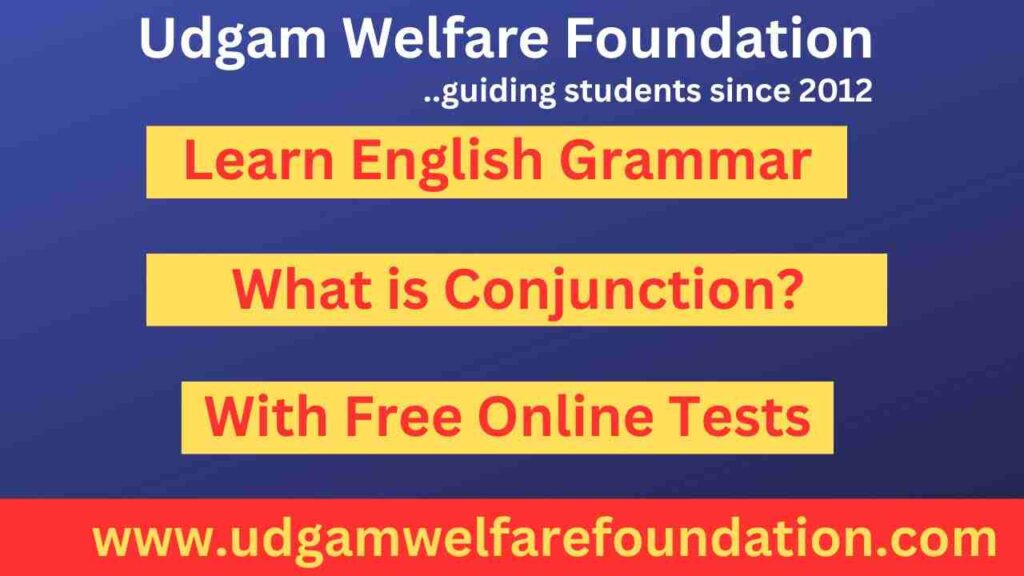Conjunctions ( संयोजक )
Definition in Simple English: A conjunction is a word that joins two words, phrases, or sentences together. It works like glue to hold different parts of a sentence in one place. Without conjunctions, we would have to speak in very short and broken sentences.
हिंदी अनुवाद: Conjunction वे शब्द होते हैं जो दो या दो से अधिक शब्दों, वाक्यांशों या वाक्यों को आपस में जोड़ते हैं। यह वाक्य के हिस्सों को एक साथ जोड़ने का काम करते हैं।
What are Conjunctions? (Detailed Explanation)
Conjunctions are joining words that help connect parts of a sentence smoothly. They help make speech and writing flow better. For example: “I like tea and coffee.” Here, the word “and” joins two things: tea and coffee. Without conjunctions, we would say: “I like tea. I like coffee.” That feels robotic. Using conjunctions adds fluency and makes expression clearer and smoother. There are three main types of conjunctions: coordinating, subordinating, and correlative.
हिंदी अनुवाद: Conjunctions ऐसे शब्द होते हैं जो वाक्य के भागों को जोड़ते हैं जिससे भाषा अधिक प्रवाहपूर्ण हो जाती है। उदाहरण के लिए: “I like tea and coffee.” यहाँ “and” शब्द दो चीजों को जोड़ रहा है: चाय और कॉफी।
Types of Conjunctions (प्रकार)
- Coordinating Conjunctions: They connect two equal parts. Examples: and, but, or, nor, for, so, yet.
Example: She is tired but she is working. - Subordinating Conjunctions: They join a dependent clause to an independent clause. Examples: because, although, since, unless, if.
Example: I went inside because it was raining. - Correlative Conjunctions: These work in pairs. Examples: either…or, neither…nor, both…and.
Example: Either you study or you fail.
हिंदी अनुवाद:
- Coordinating Conjunctions: समान भागों को जोड़ते हैं।
- Subordinating Conjunctions: मुख्य वाक्य और आश्रित वाक्य को जोड़ते हैं।
- Correlative Conjunctions: ये जोड़ों में काम करते हैं जैसे – either…or
Common Rules and Tips
- Use a comma before “but” or “yet” if they join two full sentences.
- Do not use a comma before “and” when it joins only two words or short phrases.
- “Because” introduces a reason. Example: He was late because of traffic.
- Use “either…or” and “neither…nor” for options and negatives respectively.
- Don’t repeat conjunctions unnecessarily. It makes sentences confusing.
Fill in the Blanks
- I want to go to the park, _____ it is raining.
- She is not only beautiful _____ also smart.
- You can have tea _____ coffee.
- He didn’t come _____ he was sick.
- I will call you _____ I reach home.
- They ran fast, _____ they missed the bus.
Answers and Explanation:
- but — Joining two opposite ideas
- but — Correlative pair “not only…but also”
- or — Showing a choice
- because — Showing reason
- when — Showing time condition
- but — Showing contrast
Common Errors and Fixes
- Wrong: I like both tea and also coffee.
Right: I like both tea and coffee. - Wrong: Although he was sick but he went to school.
Right: Although he was sick, he went to school. - Wrong: Neither John or Sam came.
Right: Neither John nor Sam came.
Find the Error (Correct the Sentence)
- He is rich and also he is kind.
- We were late because of we missed the bus.
- Although she studied hard but she failed.
- I will come when that you call me.
- Neither Ramesh or Suresh attended the meeting.
Answers:
- He is rich and kind.
- We were late because we missed the bus.
- Although she studied hard, she failed.
- I will come when you call me.
- Neither Ramesh nor Suresh attended the meeting.
Passage 1:
Meena likes to dance and sing. She practices every day because she wants to perform in school. Although she feels nervous, she continues to try. Her friends cheer for her when she goes on stage.
Questions:
- Which conjunction shows the reason?
- Which shows contrast?
- Which shows time?
Answers:
- because
- although
- when
Passage 2:
Ravi wanted to go out, but it started raining. He waited inside until the rain stopped. Then he went to meet his friend. They had fun although they got wet.
Questions:
- Which conjunction shows opposite ideas?
- Which one shows time condition?
- Which shows contrast with a result?
Answers:
- but
- until
- although

